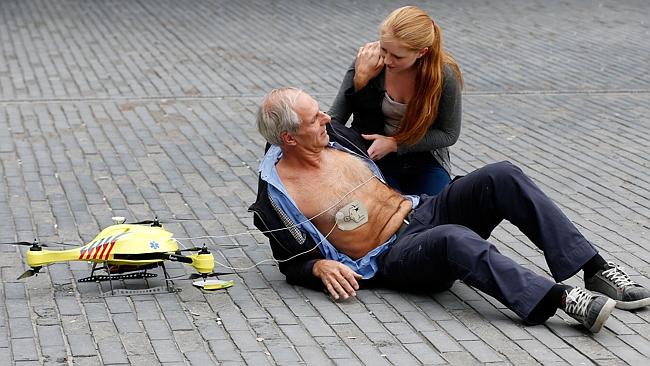
A woman gives a demonstration of an ambulance drone with built in defibrillator at Delft Technical University in the Netherlands. Picture: Bas Czerwinski. Source: AFP
A DUTCH-based student has unveiled a prototype of an “ambulance drone”, a flying defibrillator able to reach heart attack victims within precious lifesaving minutes. Developed by Belgian engineering graduate Alec Momont, it can fly at speeds of up to 100km/h.
“Around 800,000 people suffer a cardiac arrest in the European Union every year and only 8 per cent survive,” Momont, 23, said at the TU Delft University in the Netherlands on Tuesday.
“The main reason for this is the relatively long response time of emergency services of around 10 minutes, while brain death and fatalities occur within four to six minutes,” he said in a statement.

The defibrillator weighs around 4kg and can fly at the speed of 100km/h. It can quickly deliver a defibrillator to patients suffering from a heart attack. Picture: Bas Czerwinski. Source: AFP
“The ambulance drone can get a defibrillator to a patient within a 12 square kilometre zone within a minute, increasing the chance of survival from 8 per cent to 80 per cent.” Painted in emergency services yellow and driven by six propellers, the drone can carry a four kilogram load — in this case a defibrillator.
It tracks emergency mobile calls and uses the GPS to navigate. Once at the scene, an operator, like a paramedic, can watch, talk and instruct those helping the victim by using an on-board camera connected to a control room via a lifestream webcam.
The prototype has already attracted the interest of emergency services including that of Amsterdam, the Dutch daily Algemeen Dagblad said.

Graduate TU Delft student Alec Momont shows off his design. Picture: Bas Czerwinski. Source: AFP
The Dutch Heart Foundation also applauded the idea, the newspaper added.
Mr Momont however wants his drone to become a “flying medical toolbox” able to carry an oxygen mask to a person trapped in a fire or an insulin injection to a diabetes sufferer.
However, the drone is still in its infancy as far as developing its steering mechanism and legal issues regarding its use are concerned, Mr Momont said.
He said he hopes to have an operational emergency drone network across the Netherlands in five years.
Each drone is expected to cost around $22,500.
“I hope it will save hundreds of lives in the next five years,” Mr Momont said.
Originally published as Ambulance drone ‘could save hundreds’
